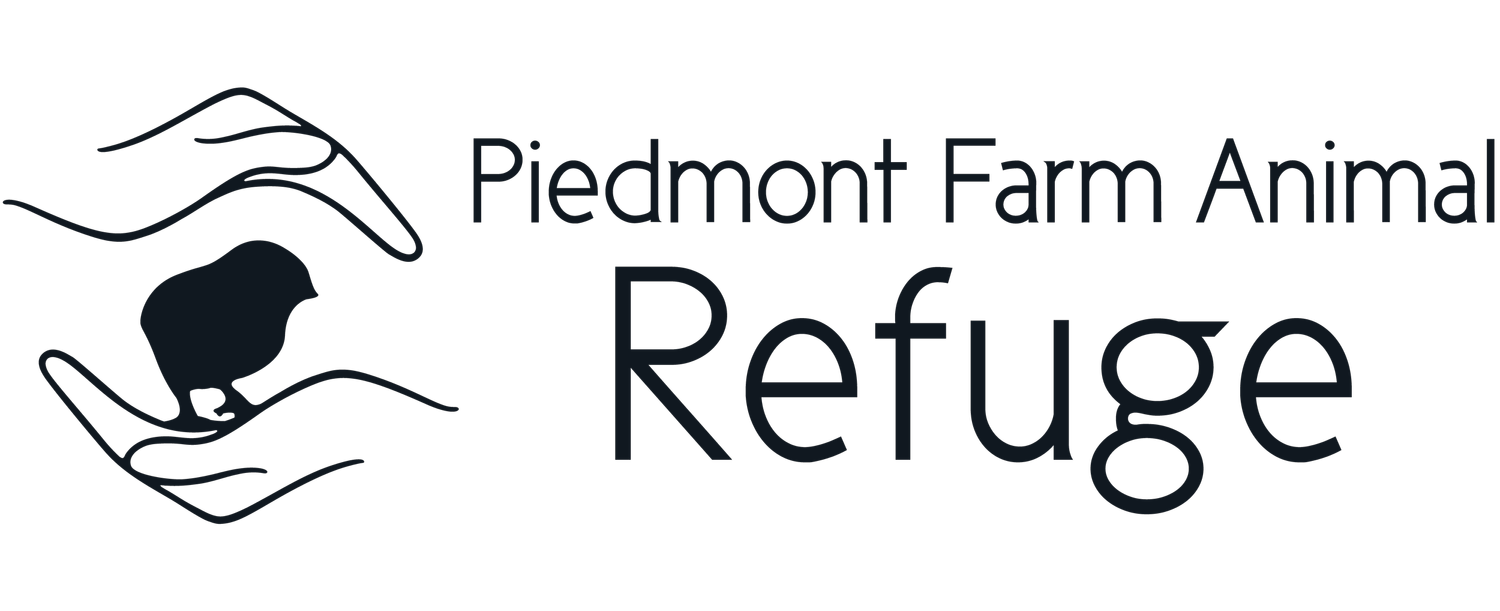Factory Farming: Turkeys
By Barbara Hengstenberg for Piedmont Farm Animal Refuge
When visiting the turkey residents at Piedmont Farm Animal Refuge, one is likely to be greeted by fully fluffed feathers, oftentimes with wings confidently sweeping the ground. These turkeys love visitors, and show it by their plumage display and strutting. Some of these residents even enjoy a human snuggle. Turkeys are curious beings, with a well-developed vocabulary, who quickly learn the lay of the land. In fact, they recognize one another by voice and head characteristics. The turkey residents at the Refuge enjoy a life of community with one another and their chicken friends.
However, for turkeys in factory farms, life couldn’t be more different and more horrific. Close to 300 million turkeys are killed in factory farms in the U.S. each year. They endure pain and harsh living conditions from the day they are born until the day they are killed. The USDA does not even provide the most basic protections for turkeys, as they are not included in the “Humane Methods of Slaughter Act,” which requires animals to be unconscious before being killed.
Turkeys who are bred for meat in factory farms are nothing like wild turkeys. Wild turkeys live free in the wild for years and weigh around 18 pounds, while commercial turkeys live around 126 days and weigh up to 35 pounds. This excessive weight leads to a myriad of painful, and often fatal, health issues. Genetically manipulated to grow 3 times larger than their wild counterparts, turkeys suffer from painful leg disorders including ruptured tendons, hip lesions and bone deformities. These leg issues cause severe pain and often lead to crippling.
Other results of their unnatural and rapid growth include heart attacks, circulatory disorders and organ failure. Many die from these conditions before they are even 6 months old.
Turkeys in factory farms start their lives in hatcheries in sterile incubators. After a few weeks they are moved into windowless warehouses where up to 10,000 birds may be crammed into a single building. Turkeys may be confined so tightly that each bird has only between 2.5 to 4 square feet of space each. Respiratory illnesses and swollen eyes are caused by the high dust and ammonia levels in these poorly ventilated buildings.
The stressful, crowded conditions that turkeys endure cause aggression and sometimes even cannibalism. To keep this from happening, the beak and toes are cut off without any pain relievers or anesthetics. Debeaking and detoeing is done with shears or a hot blade, and some birds die from the painful shock of these procedures.
A testament to their unhealthy and unnatural growth, particularly in the breast region, turkeys can no longer reproduce naturally, as the males cannot successfully mount the females. Therefore, all turkeys raised in factory farms are born through artificial insemination.
While living in factory farms, some turkeys become crippled due to their weight and end up dying of starvation or dehydration because they are unable to reach their food and water. This is particularly cruel for them because their breeding has caused them to be chronically hungry even when they have full access to food.
Here at the Refuge, Jordan turkey was rescued by an anonymous savior from the food industry when he was only a few weeks old. Sadly, he had already been debeaked by industry workers. His life at the Refuge has been one of comfort and communion with his fellow turkeys and their chicken friends. They often gobble in unison, and are extremely curious and friendly, and love having visitors. Here, Jordan and his turkey friends Andi and Louie have always been provided fresh food, water, straw for sleeping, shade structures and bushes for hot days, and are assured that they will forever be safely tucked into the turkey house every night.
Ninety-nine percent of meat from turkeys comes from factory farms. But even on smaller farms there are major welfare problems that affect turkeys. As long as turkeys are viewed as commodities to be used by humans, their needs and interests will never out-weigh gain in profit by farmers of all kinds.
Resources:
Hatkoff, Amy. The Inner World of Farm Animals: Their Amazing Social, Emotional, and Intellectual Capacities. NY: Henry N. Abrams, Inc., 2009. pp. 21-41.


